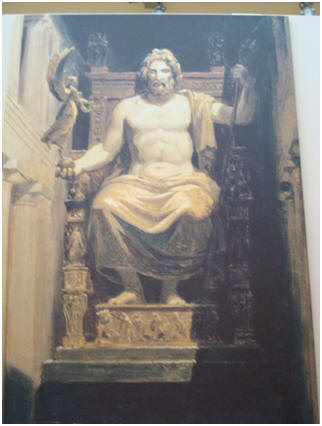|
The Monmouth College
Department of Classics presents
the Twenty-Sixth
Annual
Bernice L. Fox Classics Lecture
This lecture series was established in 1985 to
honor Dr.
Bernice L. Fox, who taught Classics at Monmouth College from
1947 until 1981. The goal of this series is to illustrate
the continuing importance of Classical studies in the modern world
and the intersection of the Classics with other disciplines in the
liberal arts. |
|

Peeking into a
Periegeteís Mind:
Probing Pausaniasí
Description of Greece

by
John
Gruber-Miller
Professor
of Classics
at
Cornell College
Biography:
http://people.cornellcollege.edu/jgruber-miller/
E-mail:
jgruber-miller@cornellcollege.edu
Where did the archaic wooden statue of Dionysos found in
Corinth come from? What is the source of the River Styx? How did
the citizens of Olympia build and preserve the great altar of Zeus
at Olympia? Why is olive oil used at Olympia to preserve Pheidiasí
cult statue of Zeus?
These are just a few of the questions that the Roman travel
writer Pausanias asks (and answers) during his tour of Greece.
Pausanias, our most important ancient source for the art and
archaeology of ancient Greece, wrote his Description of Greece
during the second century CE when the great renaissance of Greek
literature and culture known as the Second Sophistic was in full
bloom. What do these questions say about his attitude toward the
past, Greek identity, mythology and religious practices? How does
he establish his identity and authority as an author and travel
writer? How does he perform research?
Over the past two summers, Prof. Gruber-Miller and two
undergraduate researchers have been probing Pausaniasís text
attempting to uncover the truth of what he writes. This illustrated
presentation will be divided into three parts: Pausaniasí research
topics/questions, his methods for reaching answers, and the
development of his authority. At the same time, we will ask our own
questions: why should we read the travel writings of a Roman in
Greek lands, what image/identity does Greece hold in our
imagination, and what can we learn about doing research today from
an ancient writer?
7:30 P.M.
Monday, February 28, 2011
Wells Theatre
Monmouth College
Monmouth, Illinois
About Bernice L. Fox /
Previous Lectures |